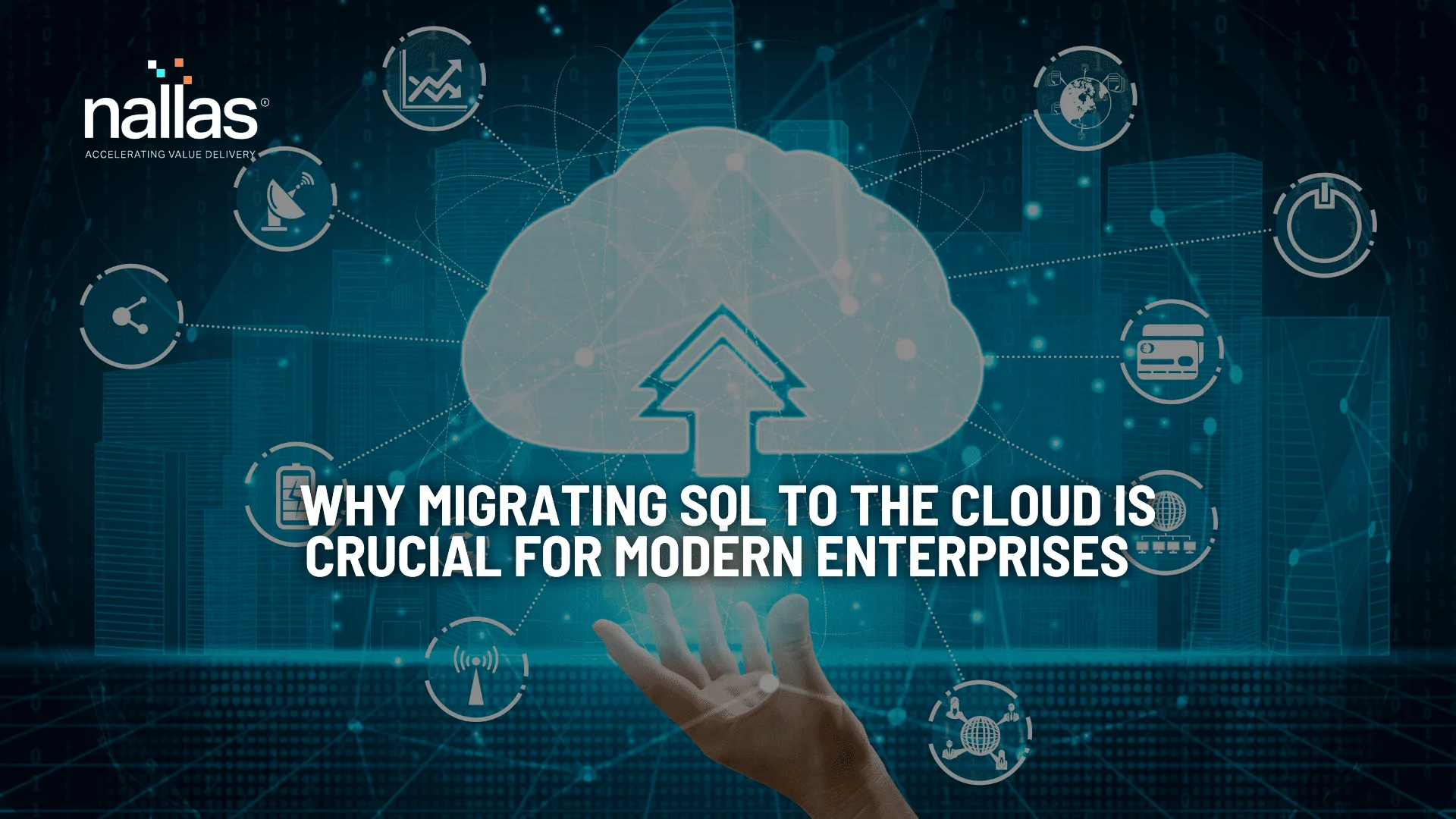
Why Migrating SQL to the Cloud is Crucial for Modern Enterprises
Businesses are constantly seeking ways to optimize and modernize their operations nowadays. One such solution is migrating SQL to the cloud, and it’s becoming increasingly popular among modern enterprises. This comprehensive guide explores the myriad benefits of making this migration, from enhanced scalability and performance to improved data security and cost savings.
By moving SQL databases to the cloud, businesses can say goodbye to the limitations of on-premises hardware and enjoy the flexibility and scalability offered by cloud-based solutions. With the ability to quickly and easily scale up or down as needed, businesses can respond swiftly to changing demands and accommodate growth without the hassle of physical infrastructure.
What’s more, the cloud offers advanced data security measures, ensuring that sensitive information is protected from potential breaches or disasters. Furthermore, the pay-as-you-go pricing model of cloud services helps businesses reduce costs by eliminating the need for expensive hardware investments and maintenance.
Advantages of migrating SQL to the cloud
In today’s rapidly evolving digital landscape, businesses are constantly seeking ways to optimize their operations and stay ahead of the curve. One such transformative solution is the migration of SQL databases to the cloud. This strategic move offers a myriad of benefits that can propel modern enterprises to new heights of success.
Firstly, the cloud provides unparalleled scalability, allowing businesses to easily scale their SQL databases up or down as per their changing needs. This flexibility is a game-changer, as it enables companies to respond swiftly to fluctuations in demand without the hassle of managing physical infrastructure. Whether it’s a sudden spike in user activity or the need to accommodate long-term growth, the cloud’s scalability ensures that your SQL databases can seamlessly adapt to these dynamics, ensuring optimal performance and efficiency.
Moreover, the cloud’s pay-as-you-go pricing model offers significant cost savings for businesses. By eliminating the need for costly on-premises hardware, maintenance, and IT personnel, enterprises can redirect their resources towards more strategic initiatives that drive innovation and growth. This financial flexibility empowers companies to focus on their core competencies while enjoying the benefits of a scalable and cost-effective SQL database solution.
Cost savings and scalability with cloud migration
One of the most compelling advantages of migrating SQL to the cloud is the significant cost savings it can provide. By leveraging the cloud’s pay-as-you-go pricing model, businesses can say goodbye to the hefty upfront investments and ongoing maintenance costs associated with on-premises hardware and infrastructure.
Instead, cloud-based SQL solutions offer a more streamlined and flexible approach to database management. Companies only pay for the resources they use, eliminating the need to over-provision or maintain idle capacity. This efficiency translates directly into tangible cost savings, allowing enterprises to reallocate their resources towards more strategic initiatives that drive growth and innovation.
Furthermore, the cloud’s scalability capabilities are unparalleled, enabling businesses to scale their SQL databases up or down as needed. This flexibility is particularly valuable in today’s dynamic business environment, where companies must be able to respond swiftly to changing market conditions and customer demands. With the cloud, enterprises can quickly and easily adjust their SQL resources to accommodate spikes in usage, seasonal fluctuations, or long-term expansion plans, without the constraints of physical infrastructure.
Improved security and data protection in the cloud
In an era where data breaches and cyber threats are on the rise, the security and protection of sensitive information have become paramount concerns for modern enterprises. Migrating SQL to the cloud offers a robust and comprehensive solution to these challenges, providing a suite of advanced security features that safeguard your data.
One of the key advantages of cloud-based SQL databases is the heightened levels of data encryption and access controls they offer. Cloud providers invest heavily in state-of-the-art security measures, such as encryption at rest and in transit, multi-factor authentication, and granular access permissions, ensuring that your sensitive data is shielded from unauthorized access or malicious activities.
Moreover, the cloud’s inherent disaster recovery and business continuity capabilities provide an additional layer of protection for your SQL databases. In the event of a natural disaster, system failure, or other unforeseen events, cloud-based solutions offer robust backup and recovery mechanisms, ensuring that your critical data is always available and protected from potential loss or corruption. This peace of mind is invaluable for businesses that cannot afford downtime or data breaches.
Streamlined database management and maintenance
Migrating SQL to the cloud not only enhances security and cost-efficiency but also simplifies the overall management and maintenance of your database infrastructure. Cloud-based SQL solutions typically come with a range of automated tools and services that handle the mundane tasks, allowing your IT team to focus on more strategic initiatives.
For instance, cloud providers often take care of tasks such as software updates, patches, and infrastructure management, freeing up your in-house resources. This hands-off approach to database maintenance not only reduces the workload on your IT staff but also ensures that your SQL databases are always running on the latest and most secure versions, minimizing the risk of vulnerabilities or performance issues.
Furthermore, cloud-based SQL solutions often provide comprehensive monitoring and analytics capabilities, giving you deep insights into the health and performance of your databases. This visibility empowers you to make informed decisions, optimize resource utilization, and proactively address any potential bottlenecks or issues, ultimately enhancing the overall efficiency and reliability of your SQL infrastructure.
Enhanced performance and flexibility in the cloud
The cloud not only offers cost savings and improved security but also delivers unparalleled performance and flexibility for your SQL databases. By leveraging the vast computing power and advanced infrastructure of cloud providers, businesses can enjoy lightning-fast query execution, reduced latency, and improved overall responsiveness for their SQL-powered applications.
Moreover, the cloud’s flexibility extends beyond just scaling resources. It also enables businesses to leverage a wide range of database services and features, such as advanced analytics, machine learning, and real-time data processing. By tapping into these cloud-native capabilities, enterprises can unlock new opportunities for innovation, enhance their decision-making processes, and stay ahead of the competition in their respective industries.
Key considerations before migrating SQL to the cloud
While the benefits of migrating SQL to the cloud are undeniable, it’s crucial for businesses to carefully consider several key factors before embarking on this transformative journey. Proper planning and preparation are essential to ensure a successful and seamless transition, minimizing disruptions to your operations and maximizing the long-term value of your cloud-based SQL infrastructure.
One of the primary considerations is the assessment of your existing SQL database infrastructure and workloads. It’s important to understand the specific requirements, performance needs, and data volumes of your current on-premises SQL deployments. This comprehensive evaluation will help you identify the most suitable cloud-based SQL services and configurations, ensuring that your migration aligns with your business objectives and technical requirements.
Additionally, businesses must carefully evaluate the security and compliance implications of moving their SQL databases to the cloud. While cloud providers typically offer robust security measures, it’s essential to ensure that your cloud-based SQL solution meets your industry’s regulatory standards and data privacy requirements. This may involve scrutinizing the cloud provider’s security certifications, data encryption protocols, and access control mechanisms to ensure the protection of your sensitive information.
Conclusion:
The migration of SQL databases to the cloud represents a transformative shift in the way modern enterprises approach their data management and infrastructure strategies. By harnessing the power of the cloud, businesses can unlock a wealth of benefits, from enhanced scalability and cost-efficiency to improved security and seamless database management.
The journey of migrating SQL to the cloud may seem daunting, but by following the best practices outlined in this comprehensive guide, businesses can navigate this transformation with confidence and reap the rewards of a modern, cloud-powered SQL ecosystem. From cost savings and scalability to enhanced security and streamlined maintenance, the benefits of cloud migration are undeniable.
For inquiries and more information about our Cloud engineering services, please visit our website at www.nallas.com or contact us at info@nallas.com.
